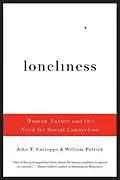Based on groundbreaking research showing that prolonged loneliness can be as harmful to your health as smoking, Loneliness is ?one of the most important books about the human condition to appear in a decade? (Daniel Gilbert, author of Stumbling on Happiness).
University of Chicago social neuroscientist John T. Cacioppo pioneered research on the startling effects of loneliness: a sense of isolation or social rejection disrupts not only our ability to think and will power but also our immune systems, and can be as damaging as obesity or smoking. On the flip side, social connection can be a powerful therapy. Cacioppo's sophisticated studies relying on brain imaging, analysis of blood pressure, immune response, stress hormones, behavior, and even gene expression show that human beings are simply far more intertwined and interdependent?physiologically as well as psychologically?than our cultural assumptions have ever allowed us to acknowledge.
Loneliness traces the evolution of these tandem forces, showing how, for our primitive ancestors, survival depended not on greater brawn but on greater commitments to each other. Serving as a prompt to repair frayed social bonds, the pain of loneliness engendered a fear response so powerfully disruptive that even now, millions of years later, a persistent sense of rejection or isolation can impair DNA transcription in our immune cells. This disruption also impairs our ability to read social signals and exercise social skills, as well as limits our ability to internally regulate our emotions?all of which can combine to trap us in self-defeating behaviors that reinforce the very isolation and rejection that we dread.
Loneliness shows us how to overcome this feedback loop to achieve better health and greater happiness. As individuals and as a society, we have everything to gain, and everything to lose, in how well or how poorly we manage our need for social bonds.
Autorentext
John T. Cacioppo (1951—2018) was a psychology professor at the University of Chicago and director of the university's Center for Cognitive and Social Neuroscience. He was the author of more than a dozen books, including Loneliness: Human Nature and the Need for Social Connections.
Klappentext
A pioneering neuroscientist reveals the reasons for loneliness and what to do about it.
John T. Cacioppo's groundbreaking research topples one of the pillars of modern medicine and psychology: the focus on the individual as the unit of inquiry. By employing brain scans, monitoring blood pressure, and analyzing immune function, he demonstrates the overpowering influence of social context—a factor so strong that it can alter DNA replication. He defines an unrecognized syndrome—chronic loneliness—brings it out of the shadow of its cousin depression, and shows how this subjective sense of social isolation uniquely disrupts our perceptions, behavior, and physiology, becoming a trap that not only reinforces isolation but can also lead to early death. He gives the lie to the Hobbesian view of human nature as a "war of all against all,” and he shows how social cooperation is, in fact, humanity's defining characteristic. Most important, he shows how we can break the trap of isolation for our benefit both as individuals and as a society.